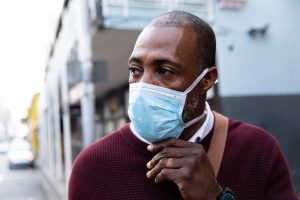Health Inequalities: Somali people’s experiences of health and social care services in Birmingham
 The Covid-19 pandemic has highlighted many health inequalities in the UK. There has been particular concern the pandemic’s disproportionate impact on BAME (Black, Asian and Minority Ethnic) communities. However, this covers a wide range of groups with specific needs, which require a more nuanced and complex understanding than can be achieved grouping so many people together under one broad term.
The Covid-19 pandemic has highlighted many health inequalities in the UK. There has been particular concern the pandemic’s disproportionate impact on BAME (Black, Asian and Minority Ethnic) communities. However, this covers a wide range of groups with specific needs, which require a more nuanced and complex understanding than can be achieved grouping so many people together under one broad term.
Our new report ‘Health Inequalities: Somali people’s experiences of health and social care services in Birmingham’ is based on interviews with members of the city’s Somali community, with a specific focus on:
- the challenges and barriers that negatively impact on Somali people’s experiences of health and social care (both prior to and during the lockdown)
- the impact that service changes, due to the pandemic, are having on the Somali community
- understanding what could improve Somali people’s experiences of health and social care services in Birmingham.
We found that the following issues have led to distrust and detachment from health and social care among the Somali community:
- lack of dignity and respect
- poor diagnosis and referral to specialist treatment
- cultural and language difficulties
- stigma and discrimination.
We identified a number of important areas for improvement, including:
- communication, information and engagement
- education and training for both Somalis (English, rights) and health and social care professionals (cultural, stereotypes and discrimination)
- access to adequate and knowledgeable interpreters/translators
- diversity in recruitment to health and social care roles in local services.
Alongside calling upon health and social care services to make changes, the report underlines Healthwatch Birmingham’s continuing commitment to hear from as many diverse communities as possible. We use this feedback to deepen our understanding of inequalities and help to improve health and social care services for everyone in Birmingham.
‘Our new report impresses the urgent need for health and social care commissioners and providers to improve their understanding of the specific needs and varying circumstances of Birmingham’s different communities. Without better engagement with communities who have become further detached from the health and social care system, there is real risk that the health inequalities illuminated by the pandemic become further embedded rather than eradicated by the changes to services being made in response to Covid-19.’
– Andy Cave, CEO, Healthwatch Birmingham
We are grateful to all the participants who shared their experiences with us. We would like to thank third sector organisations and various individuals in Birmingham that supported us in accessing participants. Key to our study was Ashiana Community Project, who helped us to gather feedback from the people they support. We would also like to thank individuals from Birmingham Health Champions, The Somali Education and Cultural Centre (Nechells), HADAL (TALK), in particular Yumna Hussain for helping us access participants, and our volunteer Salma Abdullah.
